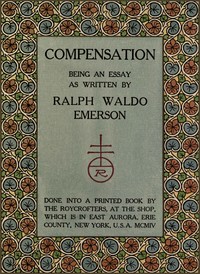Compensation : Being an essay as written by Ralph Waldo Emerson by Emerson
"Compensation: Being an Essay as Written by Ralph Waldo Emerson" is a philosophical essay penned by Ralph Waldo Emerson during the early 20th century. This work delves into the concept of justice and balance in human life, focusing on the idea that all actions carry inherent consequences and that life operates on a principle of give-and-take. Emerson, a central figure in the Transcendentalist movement, draws upon observations from nature, human behavior, and
moral philosophy to illustrate this enduring principle. In "Compensation," Emerson argues that for every pleasure or advantage gained, a corresponding burden or responsibility must be acknowledged. He discusses how life's dualities—such as good and evil, success and failure—are in constant interplay, shaping individual experiences and societal dynamics. Throughout the essay, Emerson uses a variety of examples, from personal virtues to societal laws, to demonstrate that justice is not only necessary but omnipresent. He emphasizes that every action has repercussions that can be felt immediately or unfold over time, ultimately reinforcing the notion that the universe maintains balance, and that true fulfillment comes from understanding and accepting this law of compensation. (This is an automatically generated summary.)
Read or download for free
| How to read | Url | Size | |||
|---|---|---|---|---|---|
| Read now! | https://www.gutenberg.org/ebooks/73035.html.images | 81 kB | |||
| EPUB3 (E-readers incl. Send-to-Kindle) | https://www.gutenberg.org/ebooks/73035.epub3.images | 2.2 MB | |||
| EPUB (older E-readers) | https://www.gutenberg.org/ebooks/73035.epub.images | 2.2 MB | |||
| EPUB (no images, older E-readers) | https://www.gutenberg.org/ebooks/73035.epub.noimages | 370 kB | |||
| Kindle | https://www.gutenberg.org/ebooks/73035.kf8.images | 3.5 MB | |||
| older Kindles | https://www.gutenberg.org/ebooks/73035.kindle.images | 2.3 MB | |||
| Plain Text UTF-8 | https://www.gutenberg.org/ebooks/73035.txt.utf-8 | 63 kB | |||
| Download HTML (zip) | https://www.gutenberg.org/cache/epub/73035/pg73035-h.zip | 3.0 MB | |||
| There may be more files related to this item. | |||||
Similar Books
About this eBook
| Author | Emerson, Ralph Waldo, 1803-1882 |
|---|---|
| Title | Compensation : Being an essay as written by Ralph Waldo Emerson |
| Original Publication | United States: Roycroft, 1903, pubdate 1904. |
| Note | Wikipedia page about this book: https://en.wikipedia.org/wiki/Compensation_(essay) |
| Note | Reading ease score: 69.2 (8th & 9th grade). Neither easy nor difficult to read. |
| Credits | Charlene Taylor and the Online Distributed Proofreading Team at https://www.pgdp.net (This file was produced from images generously made available by The Internet Archive/American Libraries.) |
| Language | English |
| LoC Class | PS: Language and Literatures: American and Canadian literature |
| Subject | American essays -- 19th century |
| Category | Text |
| EBook-No. | 73035 |
| Release Date | Feb 26, 2024 |
| Copyright Status | Public domain in the USA. |
| Downloads | 258 downloads in the last 30 days. |
| Project Gutenberg eBooks are always free! | |

